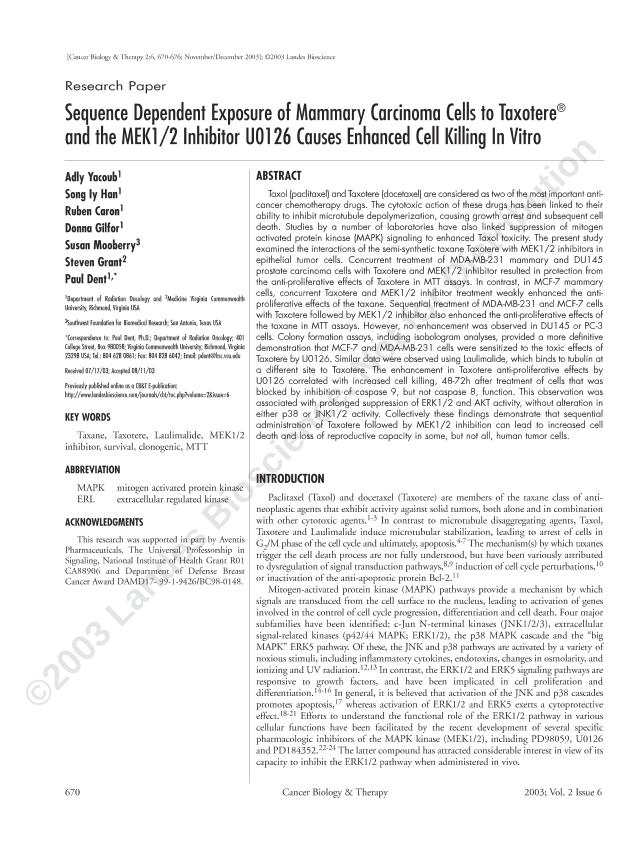Artículo
Sequence dependent exposure of mammary carcinoma cells to Taxotere® and the MEK1/2 inhibitor U0126 causes enhanced cell killing in vitro
Yacoub, Adly; Han, Song Iy; Caron, Ruben Walter ; Gilfor, Donna; Mooberry, Susan; Grant, Steven; Dent, Paul
; Gilfor, Donna; Mooberry, Susan; Grant, Steven; Dent, Paul
 ; Gilfor, Donna; Mooberry, Susan; Grant, Steven; Dent, Paul
; Gilfor, Donna; Mooberry, Susan; Grant, Steven; Dent, Paul
Fecha de publicación:
11/2003
Editorial:
Taylor & Francis
Revista:
Cancer Biology & Therapy
ISSN:
1538-4047
e-ISSN:
1555-8576
Idioma:
Inglés
Tipo de recurso:
Artículo publicado
Clasificación temática:
Resumen
Taxol (paclitaxel) and Taxotere (docetaxel) are considered as two of the most important anticancer chemotherapy drugs. The cytotoxic action of these drugs has been linked to their ability to inhibit microtubule depolymerization, causing growth arrest and subsequent cell death. Studies by a number of laboratories have also linked suppression of mitogen activated protein kinase (MAPK) signaling to enhanced Taxol toxicity. The present study examined the interactions of the semi-synthetic taxane Taxotere with MEK1/2 inhibitors in epithelial tumor cells. Concurrent treatment of MDA-MB-231 mammary and DU145 prostate carcinoma cells with Taxotere and MEK1/2 inhibitor resulted in protection from the anti-proliferative effects of Taxotere in MTT assays. In contrast, in MCF-7 mammary cells, concurrent Taxotere and MEK1/2 inhibitor treatment weakly enhanced the antiproliferative effects of the taxane. Sequential treatment of MDA-MB-231 and MCF-7 cells with Taxotere followed by MEK1/2 inhibitor also enhanced the anti-proliferative effects of the taxane in MTT assays. However, no enhancement was observed in DU145 or PC-3 cells. Colony formation assays, including isobologram analyses, provided a more definitive demonstration that MCF-7 and MDA-MB-231 cells were sensitized to the toxic effects of Taxotere by U0126. Similar data were observed using Laulimalide, which binds to tubulin at a different site to Taxotere. The enhancement in Taxotere anti-proliferative effects by U0126 correlated with increased cell killing, 48-72h after treatment of cells that was blocked by inhibition of caspase 9, but not caspase 8, function. This observation was associated with prolonged suppression of ERK1/2 and AKT activity, without alteration in either p38 or JNK1/2 activity. Collectively these findings demonstrate that sequential administration of Taxotere followed by MEK1/2 inhibition can lead to increased cell death and loss of reproductive capacity in some, but not all, human tumor cells. ©2003 Landes Bioscience.
Palabras clave:
CLONOGENIC
,
LAULIMALIDE
,
MEK1/2 INHIBITOR
,
MTT
,
SURVIVAL
,
TAXANE
,
TAXOTERE
Archivos asociados
Licencia
Identificadores
Colecciones
Articulos(IMBECU)
Articulos de INST. DE MEDICINA Y BIO. EXP. DE CUYO
Articulos de INST. DE MEDICINA Y BIO. EXP. DE CUYO
Citación
Yacoub, Adly; Han, Song Iy; Caron, Ruben Walter; Gilfor, Donna; Mooberry, Susan; et al.; Sequence dependent exposure of mammary carcinoma cells to Taxotere® and the MEK1/2 inhibitor U0126 causes enhanced cell killing in vitro; Taylor & Francis; Cancer Biology & Therapy; 2; 6; 11-2003; 670-676
Compartir
Altmétricas



